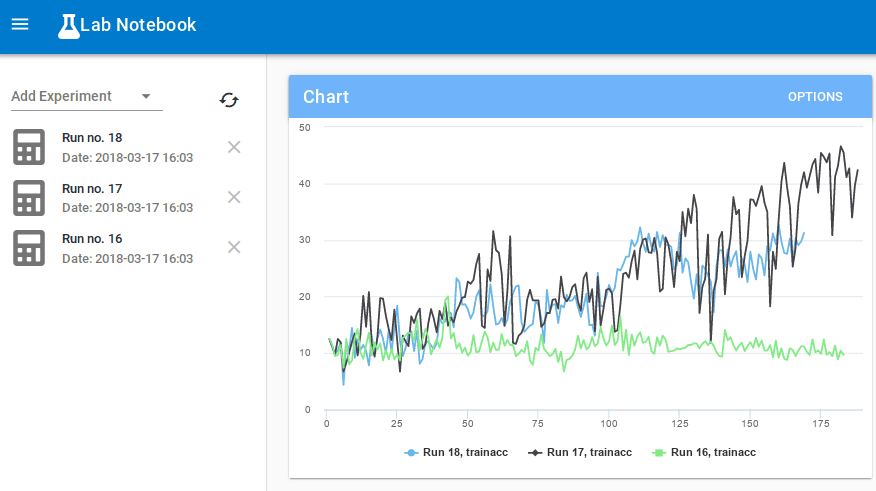labnotebook allows you to:
- flexibly save all your experimental data in a postgres database through a very simple interface, including configuration, models, results, and training curves.
- monitor any indicators from your running experiments by streaming them through a web application:

- access all this data forever through the web app, through sqlalchemy, or through traditional sql text queries.
All you need to do is to modify your code to include labnotebook.start_experiment() and labnotebook.stop_experiment() and pass the info you would like to save to the database as arguments. As an option, you can save information for each training step by using labnotebook.step_experiment().
You can see a very simple example notebook here.
Another example of how to log while training a ConvNet in PyTorch is here.
In the life sciences, scientists write everything in their lab notebooks. I wanted a similar permanent store for my PyTorch experiments that allowed me to:
-
asynchronously look at what was going on. TensorBoard obviously provides excellent functionality, albeit with an interface and storage system that I didn't especially like. It's very hard to keep track of all the indicators of old experiments and to compare them to newer experiments.
-
store everything forever in a queryable database. Sacred provides some of this functionality, but the interface is complex and inflexible. In addition, I think experimental data is relational data intermixed with nosql data, and postgres is better adapted to the type of queries for this kind of experimental data.
For a quick read on the tech stack choices I made, check out my blog post.
Follow the detailed installation guides, create your database, and make a note of your database's url. It's usually of the form postgres://<username>:<password>@localhost/<databasename>.
Note you need version 9.4+.
Clone the repository:
git clone https://github.com/henripal/labnotebook.git
Enter the directory and install labnotebook locally:
cd labnotebook
pip install .
Once you've installed the package, you can run the following command on your database url to start the API:
start_backend <database_url>
Navigate to the frontend directory and serve it; for example using python 3's http.server:
cd frontend
python -m http.server
Then open the serving address and port, typically http//localhost:8000 if you're using the python server.
A simple example notebook is available here.
A more realstic example, training a convolutional neural network on MNIST in PyTorch and logging with labnotebook is available here.
This is a very early alpha version of the tool that I'd thought some people might enjoy. I haven't tested it on older browsers or frameworks. For now I've tested this only on Ubuntu, with PyTorch-style experiments, using chromium. I'm happy to get any feedback of how this runs on other platforms!
I'm by myself working on this and there are bugs galore. Any contributions are welcome; let me know if you would like to contribute but not sure how to go about doing it, and I'll walk you through it!
The front-end of this project uses VueJS, Vuetify and Highcharts.
If you like this and want to be updated on what I'm doing, follow me on twitter?